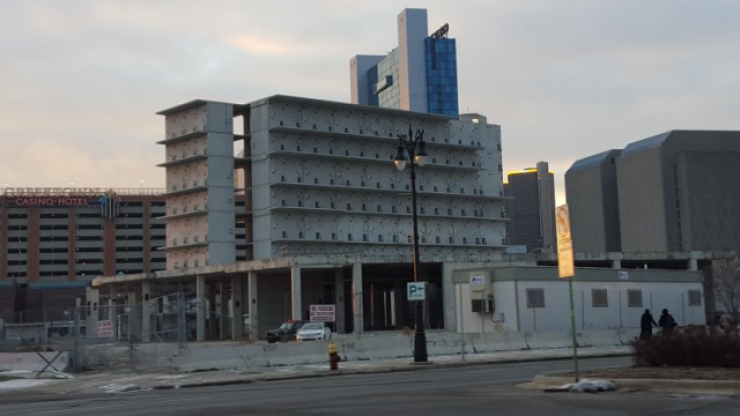DALLAS -- Wayne County officials say that plans to relocate its jail and abandon its partially built bond-financed jail in downtown Detroit remain in play even after plans to build a soccer stadium on the site evaporated.
The Major League Soccer expansion bid for Detroit shifted substanially Thursday, when the ownership group led by Tom Gores and Dan Gilbert said the NFL Detroit Lions' owners, the Ford family, joined the bid, which now calls for the MLS team to play at the Lions' 65,000-seat Ford Field.
Gores, owner of the NBA Detroit Pistons, and Gilbert, a big downtown Detroit real estate player and owner of the NBA Cleveland Cavaliers, had previously touted a soccer-specific stadium at the Gratiot Avenue jail site.
In exchange the duo, through Gilbert’s firm Rock Ventures, proposed to build Wayne a new Criminal Justice Center jail, criminal courthouse, prosecutors' offices, sheriff's administrative offices and a juvenile detention facility.
That plan called for county bond financing, including unspent bond proceeds from the unfinished Gratiot jail at an approximate cost of $520.3 million. The county would be responsible for $380 million plus the cost of acquiring the land and Rock would cover any cost overruns. The $380 million would be funded through a combination of unused proceeds from a $200 million direct-pay, taxable recovery zone economic development bonds (RZEDBs) sold in 2010 by the Wayne County Building Authority and the issuance of about $200 million of new bond.

Rossetti, a Detroit-based architectural firm, determined the football stadium could be developed into a state-of-the-art soccer venue, officials said. It is unclear how renovations for the soccer adaptation of the field would be financed.
“We were recently informed that the partnership between Tom Gores and Dan Gilbert has amended its application to include the William Clay Ford family. The amended application also states that Ford Field is the group’s preferred stadium site,” according to a statement released by MLS on Thursday afternoon.
MLS officials added they have not had an opportunity to fully evaluate the amended application. They did note, however, that it prioritizes soccer-specific stadiums as a criteria when selecting MLS expansion markets.
County executive Warren Evans said that the decision to use Ford Field rather than building a new soccer stadium on the Gratiot site made sense and he applauded the collaborative effort. However Evans said that the focus for the county remained to complete negotiations with Rock Ventures and bring other new investment to Gratiot.
“The deal with Rock is very much alive and still being negotiated,” said James Martinez, a spokesman for the county executive. “The Gratiot site is still part of that potential deal."
He also said completing the unfinished Gratiot jail is also still an option for the county should the county not reach a deal with Rock.
"The news from the county perspective doesn't change anything other than if the County reaches a deal with Rock to build the criminal justice complex at Warren/I-75, their plans for Gratiot would not likely include a soccer stadium,” Martinez said.
In October, the county and the city of Detroit agreed to a land swap to frees up the Gratiot jail. Under the agreement the county would take ownership of a portion of a Detroit Department of Transportation property where the new jail would be built under the proposal being pursued by Gilbert's Rock Ventures. In return, Detroit receives ownership of the 1.4 million-square-foot American Motors Corp. site on Detroit's west side, which is owned by the county land bank.
The plan to move the jail to alternative site still hinges on an Internal Revenue Service decision on whether the county can use jail bond proceeds from the original borrowing to build on the alternative site. That decision is still pending.
The IRS in July 2015 began conducting a targeted audit of the Wayne County Building Authority's 2010 bonds due to concerns about possible tax code violations, according to a disclosure notice the county filed. Jail construction began in 2011 but was halted in 2013 due to rising costs.
The IRS notified the county about six months ago that the audit was resolved without any adverse action and no penalties would be imposed as long as about $50 million of remaining proceeds were used to complete the project on the current site.
Opting to move the site would expose the authority to losing the federal subsidy payments the county receives for the taxable bonds that were issued under the recovery zone economic development bond program. At risk is a total of about $170 million in subsidies, which includes more than $50 million the county has received so far.
The county is also reviewing a second proposal submitted by Chicago-based Walsh Construction to complete the jail at the Gratiot site.





